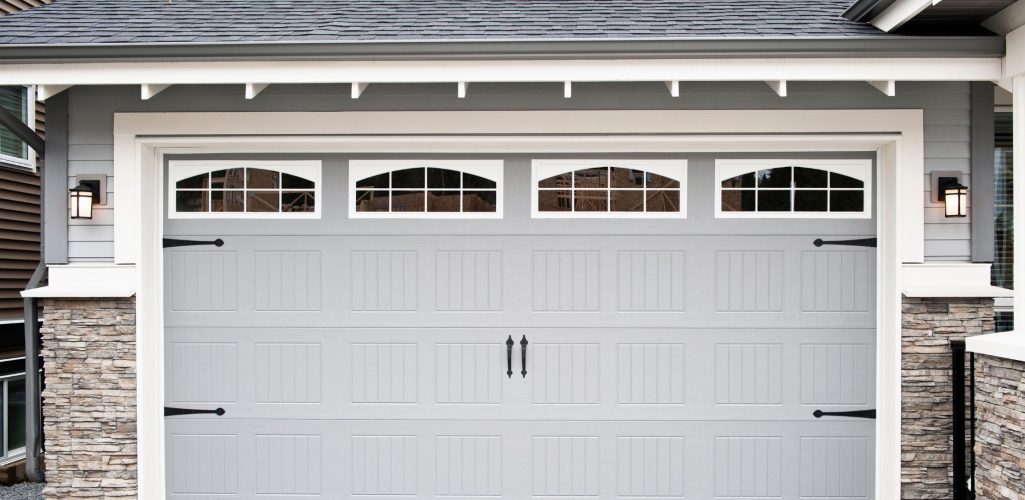It’s been a great morning until you go to open the garage and it won’t open, now you’re late for work and your car is stuck inside. So what’s next, who pays for this? Homeowners Insurance seems like a giant umbrella policy, but how do you know if everything is indeed covered? What about your garage?
There are still some unanswered questions because everyone’s property and residences are different. However, homeowners insurance is defined as an insurance policy that covers your dwellings, other structures, personal property, and liability.
Does Homeowners Insurance Cover Garage Doors?
The simple answer is yes, insurance will cover garage doors in the case of peril. Peril can include natural disasters, fire, theft, vandalism, or other particular scenarios out of your control.
While coverage may differ depending on the policy and the location of the garage, it is safe to say it should be covered with your homeowner’s insurance. The dwelling portion of your insurance should cover damage to your garage if it is attached to your home. If the garage is separate, it will likely be covered in the ‘other structures’ part of your policy.
Conditions Under Which Your Homeowners Insurance Will Cover Your Garage Door.
In most cases, insurance will cover damage to your garage door in the case of any perils, damage by a vehicle, or a falling object like a tree. For example, if your teenager pulls too far forward into the driveway and drives through the garage door, this would be covered by the dwelling coverage. Although it would be different if the garage was unattached, the same perils are covered.
Sometimes the whole garage will need fixing and other times it is just the door. In both cases, your insurance policy should cover it. However, the coverage is less for detached garages because that falls in the ‘other structures’ part. This usually means that other sutures coverage is about 10% of the dwelling coverage. To put it in simpler terms, if your dwelling coverage is $500,000, your other structures’ coverage would be capped at $50,000. However, if there is damage to a garage and another part of your property you would only need to pay one deductible.
Can Upgrading Your Garage Door Reduce Your Homeowners Insurance Policy Costs?
Upgrading your garage doors is a great way to lower your liability and the overall cost of your insurance policy. This is also a great way to increase the value of your home. There are a few ways to do this that may work depending on your needs based on your geographical location.
- A steel door may work best for you if you live in a tornado, hurricane, or just an overall high-wind area. This heavy door will help prevent damage due to weather.
- An insulated door will work best for places with extreme cold and extreme heat. This can help either keep the cold in or out depending on what you need for the climate you live in.
- A glass or vinyl door could help in areas with heavy flooding or rain. This type of door will protect from rust, dents, cracks, and fading due to constant water.
- Aluminum garage doors are great for places with a more coastal climate to resist rusting or oxidation.
- A fiberglass door can be extremely useful if you have a mild climate and like the look of a wooden door without wanting the maintenance or risk of termites.
How to Determine if Your Insurance Covers Your Garage Door?
The best option to determine if garage doors are covered in your policy would be to reach out to your agent and confirm the details and coverage. Asking questions that would be beneficial in your situation is vital to fully understanding your own policy.
How Can You File a Garage Door Claim?
A claim can be filed with your insurance if you believe it is eligible. The first step would be taking lots of photos to document the damage done and contacting your insurance agent to get the claim started. You may be asked to contact a garage repair company to get estimates on the damage. From there you will be able to pay the deductible and get the repairs covered or have to pay out of pocket for the damages.
Damages To Garage Doors, Not Covered By Home Insurance.
There are some cases however where insurance would not cover garage damage. There are very few but it is better to take note and know the circumstances ahead of time.
- If a third party is involved there is a good chance they would be liable for the damage. If the damage was caused by their car it would be filed with their auto insurance to be taken care of instead of your homeowner’s insurance.
- If there was a pest infestation that damages the mechanics of the door as well as the property inside the garage it will likely not be covered because it is considered preventable.
- General wear and tear issues will not be covered by homeowner’s insurance as that is meant to be taken care of by the consumer, not insurance. This case is also preventable by being aware of maintenance needs.
- Flood or Earthquake damage to your garage will not be covered by standard
homeowners insurance. While you may think this fits under standard perils, it is an additional policy to add to your homeowners insurance.
Call G&G for your homeowners insurance free quote. We have many agents who would love to help you compare insurance rates and save money today!


